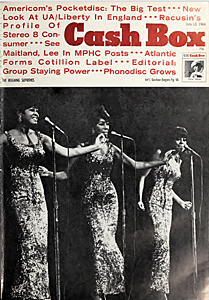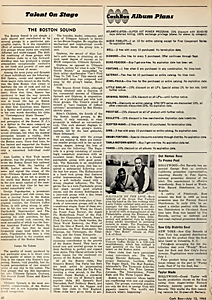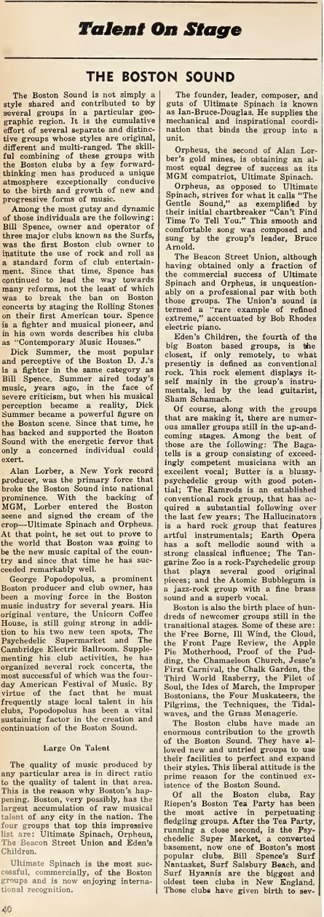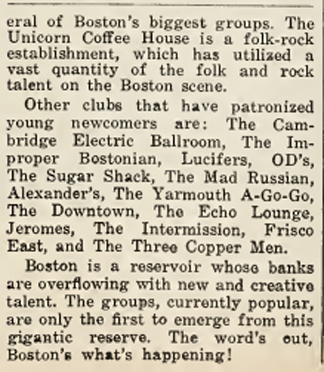
Jonathan Richman | Dogmatics Photo | Paley Brother's Story
Boston Sound Home Page
Talent on Stage
The Boston Sound
Cashbox July 13, 1968
 |
 |
The Boston Sound is not simply a style shared and contributed to by several groups in a particular geographic region. It is the cumulative effort of several separate and distinctive groups whose styles are original, different and multi-ranged. The skillful combining of these groups with the Boston clubs by a few forward-thinking men has produced a unique atmosphere exceptionally conducive to the birth and growth of new and progressive forms of music.
Among the most gutsy and dynamic of those individuals are the following:
Bill Spence, owner and operator of three major clubs known as the Surfs, was the first Boston club owner to institute the use of rock and roll as a standard form of club entertainment. Since that time, Spence has continued to lead the way towards many reforms, not the least of which was to break the ban on Boston concerts by staging the Rolling Stones on their first American tour. Spence is a fighter and musical pioneer, and in his own words describes his clubs as "Contemporary Music Houses."
 Dick Summer, the most popular and perceptive of the
Boston D. J.'s Is a fighter in the same category as Bill Spence. Summer
aired today's music, years ago, in the face of severe criticism, but when
his musical perception became a reality, Dick Summer became a powerful
figure on the Boston scene. Since that time, he has backed and supported
the Boston Sound with the energetic fervor that only a concerned individual
could exert.
Dick Summer, the most popular and perceptive of the
Boston D. J.'s Is a fighter in the same category as Bill Spence. Summer
aired today's music, years ago, in the face of severe criticism, but when
his musical perception became a reality, Dick Summer became a powerful
figure on the Boston scene. Since that time, he has backed and supported
the Boston Sound with the energetic fervor that only a concerned individual
could exert.
Alan Lorber, a New York record producer, was the primary force that broke the Boston Sound into national prominence. With the backing of MGM, Lorber entered the Boston scene and signed the cream of the crop - Ultimate Spinach and Orpheus. At that point, he set out to prove to the world that Boston was going to be the new music capital of the country and since that time he has succeeded remarkably well,
George Popodopolus, a prominent Boston producer and club owner, has been a moving force in the Boston music industry for several years. His original venture, the Unicorn Coffee House, is still going strong in addition to his two new teen spots, The Psychedelic Supermarket and The Cambridge Electric Ballroom. Supplementing his club activities, he has organized several rock concerts, the most successful of which was the four-day American Festival of Music. By virtue of the fact that he must frequently stage local talent in his clubs, Popodopolus has been a vital sustaining factor in the creation and continuation of the Boston Sound.
Large On TalentThe quality of music produced by any particular area is in direct ratio to the quality of talent in that area. This is the reason why Boston's happening. Boston, very possibly, has the largest accumulation of raw musical talent of any city in the nation. The four groups that top this impressive list are: Ultimate Spinach, Orpheus, The Beacon Street Union and Eden's Children.
Ultimate Spinach is the most successful, commercially,
of the Boston groups and is now enjoying international recognition.
lan-Bruce-Douglas. He supplies the mechanical and inspirational
coordination that binds the group into a unit
Orpheus, the second of Alan Lorber's gold mines, is
obtaining an almost equal degree of success as its MGM compatriot, Ultimate
Spinach.
Orpheus, as opposed to Ultimate Spinach, strives for
what it calls "The Gentle Sound," as exemplified by their initial chartbreaker
"Can't Find Time To Tell You." This smooth and comfortable song was composed
and sung by the group's leader, Bruce Arnold.
The Beacon Street Union, although having obtained only a fraction of the commercial success of Ultimate Spinach and Orpheus, is unquestionably on a professional par with both those groups. The Union's sound is termed a "rare example of refined extreme," accentuated by Bob Rhodes electric piano.
Eden's Children, the fourth of the big Boston based groups, is the closest, if only remotely, to what presently is defined as conventional rock. This rock element displays itself mainly in the group's instru-mentals. led by the lead guitarist, Sham Schamach.
Of course, along with the groups that are making it, there are numerous smaller groups still in the up-and-coming stages. Among the best of those are the following: The Bagatelle is a group consisting of exceedingly competent musicians with an excellent vocal; Butter is a blussy-psychedelic group with good potential; The Ramrods is an established conventional rock group, that has acquired a substantial following over the last few years; The Hallucinations is a hard rock group that features artful instrumentals, Earth Opera has a soft mellodic sound with a strong classical influence; The Tangarine Zoo is a rock-Psychedelic group that plays several good original pieces; and the Atomic Bubblegum is a jazz-rock group with a fine brass sound and a superb vocal.
 Boston is also the birth place of hundreds of newcomer groups still in
the transitional stages. Some of these are: the Free Borne, Ill
Wind, the Cloud, the Front Page Review,
the Apple Pie Motherhood Band, Proof of the Pudding,
the Chamaeleon Church, Jesse's First Carnival,
the Chalk Garden, the Third World Rasberry,
the Filet of Soul, the Ides of March,
the Improper Bostonians, the Four Muskateers,
the Pilgrims, the Techniques, the Tidal
Waves, and the Grass Monagerie.
Boston is also the birth place of hundreds of newcomer groups still in
the transitional stages. Some of these are: the Free Borne, Ill
Wind, the Cloud, the Front Page Review,
the Apple Pie Motherhood Band, Proof of the Pudding,
the Chamaeleon Church, Jesse's First Carnival,
the Chalk Garden, the Third World Rasberry,
the Filet of Soul, the Ides of March,
the Improper Bostonians, the Four Muskateers,
the Pilgrims, the Techniques, the Tidal
Waves, and the Grass Monagerie.
The Boston clubs have made an enormous contribution to the growth of the Boston Sound. They have allowed new and untried groups to use their facilities to perfect and expand their styles. This liberal attitude is the prime reason for the continued existence of the Boston Sound.
Of all the Boston clubs, Ray Riepen's Boston Tea Party has been the most active in perpetuating fledgling groups. After the Tea Party, running a close second, is the Psychedelic Super Market, a converted basement, now one of Boston's most popular clubs. Bill Spence's Surf Nantasket, Surf Salsbury Bench, and Surf Hyannis are the biggest and oldest teen clubs in New England. Those clubs have given birth to several of Boston's biggest groups. The Unicorn Coffee House is a folk-rock establishment, which has utilized a vast quantity of the folk and rock talent on the Boston scene.
Other clubs that have patronised young newcomers are: The Cambridge Electric Ballroom, The Improper Bostonian, Lucifer's, OD's, The Sugar Shack, The Mad Russian, Alexander's, The Yarmouth A-Go-Go, The Downtown, Tho Echo Lounge, Jeromes, The Intermission, Frisco East, and The Three Copper Men .
Boston is a reservoir whose banks are overflowing with new and creative talent. The groups, currently popular, are only the first to emerge from this gigantic reserve. The word's out, Boston's what's happening!
Home | WLYN | WMBR | Boston Groupie News | Punk Photos | MP3's | Links
Jonathan Richman | Dogmatics Photo | Paley Brother's Story